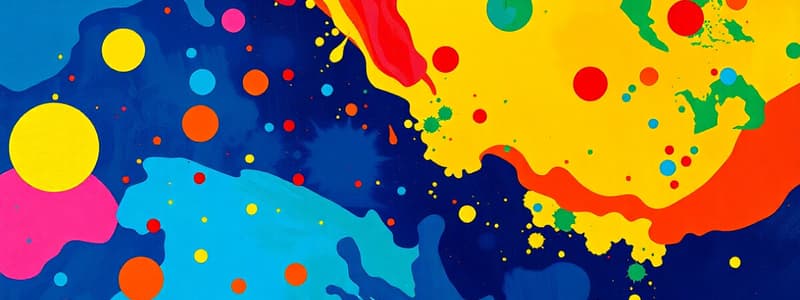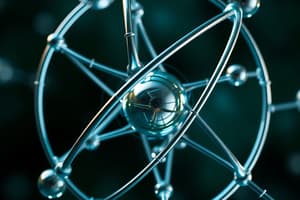Podcast
Questions and Answers
Matter is any substance that occupies space and has mass.
Matter is any substance that occupies space and has mass.
True (A)
There are 118 elements, and all of them occur naturally.
There are 118 elements, and all of them occur naturally.
False (B)
The nucleus of an atom contains electrons and neutrons.
The nucleus of an atom contains electrons and neutrons.
False (B)
Hydrogen is the only atom that can have no neutrons.
Hydrogen is the only atom that can have no neutrons.
Oxygen, carbon, hydrogen, and nitrogen are the four elements common to all living organisms.
Oxygen, carbon, hydrogen, and nitrogen are the four elements common to all living organisms.
Flashcards
What is Matter?
What is Matter?
Any substance that occupies space and has mass.
Do all 118 elements occur naturally?
Do all 118 elements occur naturally?
False. Not all 118 elements occur naturally; some are synthetic.
What is in an atom's nucleus?
What is in an atom's nucleus?
False. The nucleus contains protons and neutrons.
Hydrogen and Neutrons?
Hydrogen and Neutrons?
Signup and view all the flashcards
Common Elements to all Living Organisms?
Common Elements to all Living Organisms?
Signup and view all the flashcards
Study Notes
Matter and Elements
- Matter is anything that occupies space and has mass.
- Elements are unique forms of matter with specific chemical and physical properties that can't be broken down into smaller substances by ordinary chemical reactions.
- There are 118 elements, but only 98 occur naturally.
- Each element is designated by a chemical symbol.
- The four elements common to all living organisms are: oxygen (O), carbon (C), hydrogen (H), and nitrogen (N).
The Structure of the Atom
- The smallest unit of matter retaining the element's chemical properties is the atom.
- An atom is composed of two regions: the nucleus, located at the atom's center, containing protons and neutrons; and the outermost region which holds electrons in orbit around the nucleus.
- Protons carry a positive charge, neutrons have no charge, and electrons carry a negative charge.
- Protons and neutrons are located in the nucleus of the atom, while electrons orbit around the nucleus in orbitals.
- The number of protons determines the element's atomic number.
- The number of neutrons is variable, leading to isotopes with different mass numbers.
- The mass number is the sum of the number of protons and neutrons.
- Atomic mass is the calculated mean of the mass numbers for naturally occurring isotopes.
- The masses of electrons are significantly smaller than protons or neutrons and are therefore ignored when calculating mass number.
- Electrons have negative charges equal to the positive charges of the protons in neutral atoms.
- The majority of the atom's volume is made up of empty space.
Studying That Suits You
Use AI to generate personalized quizzes and flashcards to suit your learning preferences.




